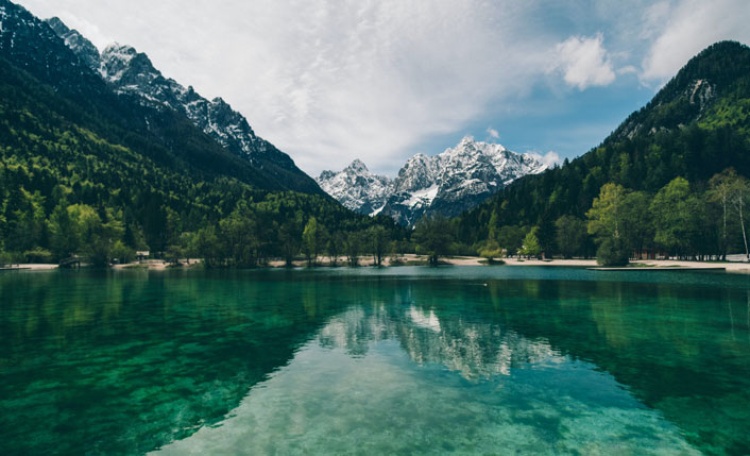Question from a reader:
I have experienced several very close deaths in my family in the past few years. I was given a copy of Heaven and have some questions. First, if God was fully capable of creating an absolutely perfect world with no sin, no hate, no jealousy, no pain, no sorrow yet still allowed people to have free will, then why didn't He start with that? Put another way: Why, if He could have started with Heaven, did He start with the less-than-best creation of Earth, which is full of pain and sorrow? Second, if, as some say, we are in “God’s perfect creation,” then that would be to say Earth is the best He could do. So why should I believe that there is another, better, home for us out there somewhere?
Answer from Doreen Button, EPM staff:
I am so sorry you’ve had so many huge losses in your life. It’s no wonder you have questions about God’s character, goodness, and participation in our world. To paraphrase Randy, it’s good that you are questioning your faith if your faith is in anything other than the God of the Bible.
And to actually quote Randy (from his book If God Is Good), “Suffering and evil exert a force that either pushes us away from God or pulls us toward him. If you base your faith on lack of affliction, your faith lives on the brink of extinction and will fall apart because of a frightening diagnosis or a shattering phone call. Token faith will not survive suffering, nor should it.”
It’s easy for those of us with a lot of time in church under our belts to cruise through life thinking we know what we believe and that what we believe is true. I commend your bravery and encourage your persistence in your search for biblical truth. Jesus promised, “keep on asking, and you will receive what you ask for. Keep on seeking, and you will find. Keep on knocking, and the door will be opened to you” (Luke 11:9, NLT).
Your questions appear to be two sides of one coin. And if I’ve read your questions correctly, your deeper question is “Can I trust a God who seems responsible for the mess and pain I’ve experienced?” Randy posits the question like this: “If God is all-good, then He would want to prevent evil and suffering. If He is all-knowing, then He would know how to prevent it. If God is all-powerful, then He is able to prevent it. And yet…a great deal of evil and suffering exists. Why?”
The Genesis account of creation tells us “God looked upon all that He had made, and indeed, it was very good” (Genesis 1:31, BSB). “All” means everything, including humans and beasts, fruit and veggies, bugs and fish. God placed man in the Garden, brought him a companion entirely suited to him and he to her. “All” was perfect for two whole chapters. The rest of the Bible tells us how God provided a way to the perfection we learn about in the last two chapters.
If God didn’t love us deeply, He’d never have bothered with His plan of redemption. Jesus wouldn’t have had to die, and we could have been sent where we belong (out of His presence for eternity) immediately. But He didn’t. He wanted relationship with us so much that He spent several thousand years, recounted in over a thousand pages, showing us how to re-join Him in His Kingdom.
But, you ask, why didn’t He make things right from the start so that nothing could go wrong, and we’d be in relationship with Him forever with no tears or death or suffering? He did. He made humans for Earth and Earth for humans. It’s where we belong. He walked with humans in their place. We are the ones who turned away and chose independence from Him. We chose suffering. We chose death. Why? Because we believed we could be like God. We thought we knew better and trusted our own opinions over God’s truth.
I honestly don’t see any way God could have made us anything other than automatons unless He gave us the freedom to choose something other than Him. He loves us and wants us to love Him. Forced or legislated love isn’t love. C.S. Lewis, in Mere Christianity, wrote,
If a thing is free to be good it is also free to be bad. And free will is what has made evil possible. Why, then, did God give them free will? Because free will, though it makes evil possible, is also the only thing that makes possible any love or goodness or joy worth having. …The happiness which God designs for His higher creatures is the happiness of being freely, voluntarily united to Him and to each other in an ecstasy of love and delight compared with which the most rapturous love between a man and a woman on this earth is mere milk and water. And for that they must be free.
. . . If God thinks this state of war in the universe a price worth paying for free will—that is, for making a live world in which creatures can do real good or harm and something of real importance can happen, instead of a toy world which only moves when He pulls the strings—then we may take it it is worth paying.
The ecstasy of a true union with God stands out brilliantly only because its backdrop is so dark. We’ve been offered deliverance and relationship which we’d merely shrug our shoulders to if we hadn’t lived in the depths of the sin and pain we’ve been delivered from.
God could have made our choices insignificant by erasing their consequences as they happened. Except if you really think about it, He couldn’t. Not because He isn’t all-powerful but because of the intrinsic impossibility of making one thing be something it’s not. I believe C.S. Lewis uses an example of a baseball bat which becomes limp when used against someone’s skull in anger but remains sturdy to hit a home run.
God will not do anything against His nature or stated will. He can’t move the proverbial immovable object, not because He's weak but because an immovable object doesn’t exist—it’s a mildly fascinating but false construct.
Randy writes, “If God disarmed every shooter and prevented every drunk driver from crashing, this would not be a real world in which people make consequential choices. It would not be a world of character development and faith building. It would not be a world where families put their arms around one another to face life’s difficulties. It would be a world where people went blithely along with their lives, content to do evil and put up with it, feeling no need to turn to God, no incentive to consider the gospel and prepare for eternity. In such a world, people would die without a sense of need, only to find themselves in Hell.”
One thing we must be very careful not to do is minimize God’s attributes in order to create a god who fits our criteria for how the world should be run. Regardless of how hard it is for us to imagine a good God allowing evil and suffering, we must not assume that He is not therefore good. Or that He is weak because He does not stop suffering, or that He doesn’t know enough to keep evil from happening.
Randy again: “Paul insists [in 2 Corinthians 4:17, cf., Romans 8:28] that our sufferings will result in our greater good—God’s people will be better off eternally because they suffer temporarily. From Paul’s perspective, this trade-off will in eternity prove to be a great bargain. In fact, the argument for the greater good may be the strongest biblical case for God permitting evil and suffering. However, it requires trust, since the promised greater good is future…If Paul is right, then by eliminating temporary evil and suffering, God would also eliminate eternal good.”
To sum up, God did make a perfect world without sin or suffering or any other bad stuff and with free will. We used free will and have lived with the consequences of our choices ever since. Our sin made the world we were created for into a place no one in their right mind would want to stay in eternally. God made Earth for humans to enjoy and steward forever and made the sacrifices necessary to see that one day we who trust His work will live here the way He originally intended. The New Earth is our return to the better home—Earth remade for humans redeemed…right here, just not right now.
Our story has a happy ending. Unfortunately, we’re still in the middle of the book where all the scary, lonely, ugly stuff happens. Hang in there, meditate on His truth, and you’ll never regret sticking with the story ‘til the grand finale:
“I saw the Holy City, the new Jerusalem, coming down out of heaven from God, prepared as a bride beautifully dressed for her husband. And I heard a loud voice from the throne saying, “Look! God’s dwelling place is now among the people, and he will dwell with them. They will be his people, and God himself will be with them and be their God. He will wipe every tear from their eyes. There will be no more death’ or mourning or crying or pain, for the old order of things has passed away” (Revelation 21:2-4, NIV).
I highly recommend C.S. Lewis’s The Problem of Pain and Randy’s book The Goodness of God for further contemplation. God bless you as you keep seeking His truth.
Photo by Adam Vradenburg on Unsplash




